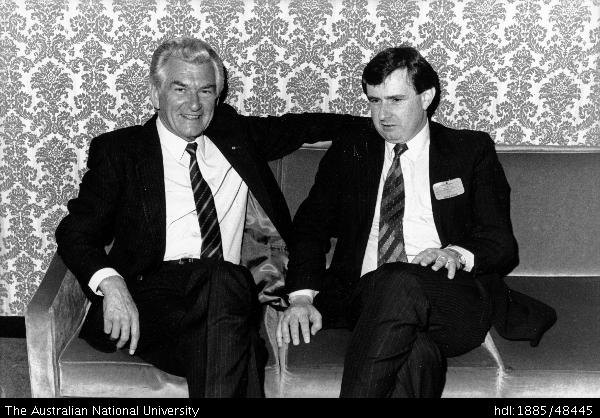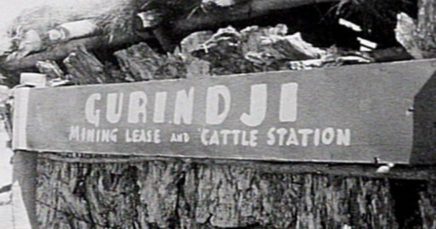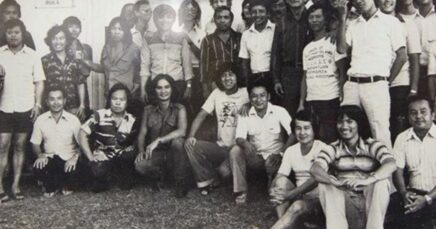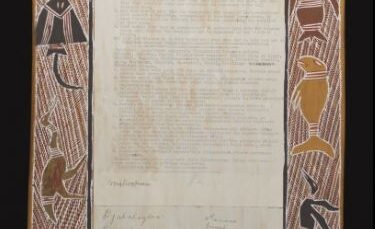The Australian union movement pays tribute to Simon Crean, former ACTU President and leader of the Storemen and Packers’ Union.

Simon passed away on 25 June 2023, he was 74 years old.
Simon was a significant union leader who made a substantial contribution to the struggle for workers’ rights. Born in Melbourne immediately after the Second World War, Simon’s was a very labour upbringing.
His father, Frank, was Deputy Prime Minister and Treasurer under Gough Whitlam. Simon would recall his father’s constituents coming over to the house on weekends to talk about the issues affecting them.
But Simon made his own way. He studied Economics and Law at Monash University. But study was not where his heart lay – he wanted to work for the movement.
He later recalled his first attempts to find employment out of university with a trade union:
“When I finished the economics degree I was sick of studying, I wanted out. I sought advice as to where I should go and I was pointed in the direction of the newly elected President of the ACTU, Bob Hawke. He’d just been elected in 1969, he was taking over on the 1st of January 1970. So I sat down and penned this letter stating all of my claims, all of my interests, all of my commitment, hoping that this would be the way out of university, get into a career that I would enjoy. I wrote that letter and I never got a response. Now that upset me and I know that, again, that you’ve probably been through this experience yourself. Again the message is ‘Persist’ because whilst I didn’t get the response I ended up getting his job.”
Simon made contact while at university with the leadership of the Federated Storemen and Packers’ Union (now part of the United Workers Union) which represented warehouse, logistics, and some manufacturing workers. He began work with the state branch as a part-time research officer in 1970, and took up a full time role in 1971 as research officer and Industrial Advocate with the federal union. He worked at the union alongside Bill Kelty – later ACTU Secretary. The union was notable for many campaigns, including setting up one of the earliest union superannuation funds.

In 1974, Simon was appointed as National Assistant Secretary of the union. He led a number of disputes, including one recently remembered by Michael Easson in a tribute to Simon. It was:
“a row over bale weights in the wool stores. The union banned bales over 180 kilograms, on the grounds that anything heavier caused back injuries and heart strain. The employers sacked 4,000 wool workers for refusing work. A dispute dragged on for six weeks, holding up $300 million in wool exports. Eventually, before the arbitration commission, wool storemen won a pay rise and recognition that overweight bales should be lightened before handling.”
In 1979, Simon was elected as Secretary of the Storemen and Packers’ and led a number of campaigns to win for workers. This included a campaign for a shorter working week for members who were engaged in heavy manual labour. He recalled of his time as a union leader:
“… it is important for union representatives of the people who work in the organisations – whether they are unions or employers – you can’t ever be removed from what their real needs are. You should never be out of touch from them, and you should always be looking for ways in which the flexibility can work and their needs addressed.”
Simon played an active role in making superannuation a major issue across the movement.
After being elected as union Secretary in 1979, Simon joined the ACTU Executive, At the May 1979 ACTU Executive meeting, Simon moved an amendment to a motion for the ACTU to further develop its superannuation policy. He was integral to the 1979 ACTU Congress’s policy on superannuation.

In 1983, the Hawke Labor Government was elected. Hawke’s Labor had an agreement with the ACTU known as the “Accord” to tackle the pressures on workers from high unemployment and high inflation. As part of this agreement unions agreed to forego certain wage rises in return for a “social wage” – the creation of new services and programs to support their quality of life.
Initially, the Accord agreement did not mention superannuation. But Simon, as ACTU Vice President, and then ACTU Secretary Bill Kelty worked together to make sure it was included.
In an interview for the history of superannuation, Workers’ Capital, by Cathy Brigden and Bernard Mees, Simon recalled: “the [draft] version of the Accord didn’t have superannuation at all mentioned. And we added ‘and superannuation’.”
It was a crucial addition. Superannuation would go on to be one of the enduring reforms of the Accord years.
In 1985 Simon was elected as President of the ACTU.
As President he worked alongside Kelty to negotiate the terms of the Accord with the Hawke Government. He also was a powerful advocate for the creation of a system of industry superannuation and defended unions against the burgeoning New Right of anti-worker neoliberals.
In 1990 Simon ran for the Labor Party in the seat of Hotham, which he held for 23 years.
Simon served in a number of Ministries in the Hawke and Keating Governments, and under Kevin Rudd and Julia Gillard.
He is perhaps best remembered as a politician for his courageous decision when leader of the Labor Party Opposition to oppose Australia’s involvement in the invasion of Iraq. Simon made very clear that he supported Australia’s troops – but not the reasons why they were being sent into combat.

Throughout his career as a union leader and a politician Simon made a substantial contribution to working people and to Australia. The union movement remembers Simon, and just as we mourn his loss, so too do we celebrate his proud legacy of contribution.
As ACTU President Michele O’Neil has said of Simon:
“Simon was a respected and loved leader of the Australian Union movement and played a significant role in multiple Ministries in four Labor Governments. He was a great believer in and fighter for fairness and justice for working people in Australia and around the world. He was a leader of conviction and courage and was generous and supportive to young unionists and all those who sought his support and advice. Simon was a man of courage and principal, he strongly opposed the Iraq war whilst Labor leader. His legacy has made a lasting impact on the wages, entitlements, safety and retirement dignity of working people. His loss will be keenly and deeply felt across our movement and we send out sincere condolences to his wife Carole and his whole family.
Vale Simon Crean a great union and Labor leader.”
By Liam Byrne, ACTU Historian.



